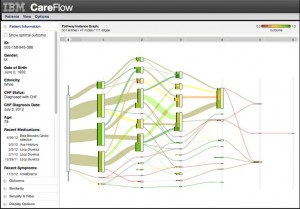 When it comes to tech partnerships, it's hard to imagine one more hard-hitting than Apple and IBM, two companies who announced this week that they would be collaborating on enterprise software for iPhones and iPads. Apple is also rolling out a new customer service and support offering specifically for enterprise customers.
When it comes to tech partnerships, it's hard to imagine one more hard-hitting than Apple and IBM, two companies who announced this week that they would be collaborating on enterprise software for iPhones and iPads. Apple is also rolling out a new customer service and support offering specifically for enterprise customers.
"The landmark partnership aims to redefine the way work will get done, address key industry mobility challenges and spark true mobile-led business change—grounded in four core capabilities," the joint release says. "A new class of more than 100 industry-specific enterprise solutions including native apps, developed exclusively from the ground up, for iPhone and iPad; unique IBM cloud services optimized for iOS, including device management, security, analytics and mobile integration; new AppleCare service and support offering tailored to the needs of the enterprise; and new packaged offerings from IBM for device activation, supply and management."
It's no secret that doctors love the iPad, and that one fact is what has allowed an unabashed consumer device to gain such a strong foothold in an enterprise like healthcare. Hospital CIOs, though, are often concerned about security, battery life, software compatibility, and a service plan for when things go wrong. They would sometimes rather their doctors use devices designed for enterprise use, a refrain we hear again and again from competing tablet vendors like Dell and Microsoft.
"Apple has made it very clear that they are not customizing their platform for business,” Dell’s Chief Medical Officer Dr. Andrew Litt told MobiHealthNews last year at HIMSS 2013. “If people want to use them in business environments that’s fine."
With the IBM news, that's no longer true. Apple is, at long last, tackling enterprise -- and not just in healthcare, but in retail, finance, insurance, and many other industries. The biggest strike that other tablet makers -- including dedicated medical tablet makers like Motion Computing -- have had against Apple in healthcare may have just gone up in smoke.
 IBM's Careflow software
IBM's Careflow software
It's actually a little confusing why Apple would finally start taking enterprise seriously now -- after it has all but proved it doesn't need to. According to Manhattan Research's James Avallone, Apple still holds a comfortable lead in hospital mobile device adoption.
"The iPhone is a top device, and it has been so since its inception,” he told MobiHealthNews in April. “During its first year being on the market, the iPhone and BlackBerry were neck-and-neck for physicians, and since then the iPhone has just really run away with it. Over the years Android devices have taken a strong second spot, but the iPhone has the majority of the marketshare and it continues to."
The iPad holds a similar lead in tablets, despite high profile Microsoft Surface buys like last month's 2,000-Surface deal with UPMC. But the Manhattan data also shows that in the last few years, mobile device adoption in hospitals in general has plateaued. When the market stops growing, there's nothing for companies to do but to go after each other's shares -- so this might be perfect timing for an enterprise play from Apple to help it hold onto its lead.
The one thing this announcement doesn't address is hardware criticisms of the iPad -- that it lacks sufficient battery life for long hospital shifts, or it isn't robust or easy enough to sterilize for the operating room. But those objections apply only to a subset of care providers, and have never been enough to offset the iPad's aesthetic or ease of use.
Apple didn't choose just any partner for its enterprise bid. IBM itself is no stranger to healthcare, after all, it made healthcare the flagship use case for Watson, the data intelligence processor that mimics human thinking and learning well enough that it managed to beat the best Jeopardy champions back in 2011. It's been providing backup support for oncologists ever since. IBM knows how to manage data in a healthcare setting.
Will Watson itself show up in the fruits of this partnership? It's certainly possible. The release talks about IBM MobileFirst for iOS Solutions: "a new class of 'made-for-business apps' targeting specific industry issues or opportunities in retail, healthcare, banking, travel and transportation, telecommunications and insurance, among others, that will become available starting this fall and into 2015."
When it comes to targeting specific issues in healthcare, with apps that will be powerful enough to persuade hospitals to go with Apple, IBM is ahead of the game with Watson and with software like the Careflow clinical decision support application IBM Research demoed at Health 2.0 last year.
The IBM-Apple partnership is sure to make waves in many of the industries it's impacting. But in healthcare specifically, it could be the reinforcement that Apple needs to hold its dominant position in the medical tablet war that's been raging since the iPad's inception.

















